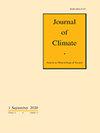Increases in the Local Eddy Energetics of the Extratropical Atmosphere over the Last Four Decades
IF 4
2区 地球科学
Q1 METEOROLOGY & ATMOSPHERIC SCIENCES
引用次数: 0
Abstract
Abstract Changes in the vertical and meridional temperature gradients of the atmosphere drive competing influences on storm track activity. We apply local eddy energetics to the ERA5, JRA55, MERRA2, and NCEP2 reanalyses during 1980–2020 to determine the locations, magnitudes, and trends of the energy transfer mechanisms for synoptic-scale eddies. Eddy kinetic energy (EKE) increases more rapidly in the Southern Hemisphere at all altitudes and seasons, with larger increases during austral winter and spring. In the Northern Hemisphere, increases occur within the Atlantic and Pacific storm tracks at pressures below 300 hPa but only during boreal winter and spring and confined within a narrow zonal band; EKE decreases during boreal summer and fall. Most EKE changes correspond with trends in baroclinic energy conversion upstream of storm tracks and appear to align with increases in the growth rate of the most unstable baroclinic mode. Barotropic energy conversion of EKE to the mean flow becomes locally more intense downstream of the storm tracks. Conversion of EKE to long-period eddies plays a minor role averaged over a hemisphere but can be important locally. The primary strengthening pathway for removal of EKE is a combination of surface friction and viscous dissipation. The increased baroclinic conversion in the Southern Hemisphere appears related to upper-level tropical temperature increases. In the Northern Hemisphere, baroclinic conversion is enabled by a combination of increased vertical heat fluxes and a region of temperature increases within 30°–60°N.过去四十年热带外大气局部涡动能量的增加
摘要 大气垂直梯度和经向温度梯度的变化对风暴活动产生了相互竞争的影响。我们对ERA5、JRA55、MERRA2和NCEP2在1980-2020年期间的再分析应用局地涡旋能量学,以确定同步尺度涡旋能量传递机制的位置、大小和趋势。在南半球,涡动能(EKE)在所有高度和季节都增加得更快,在冬季和春季增幅更大。在北半球,压力低于 300 百帕的大西洋和太平洋风暴轨道内的涡旋动能增加,但仅出现在北半球的冬季和春季,并局限在一个狭窄的带状区域内;在北半球的夏季和秋季,涡旋动能减少。大多数 EKE 变化与风暴道上游的气压能量转换趋势一致,似乎与最不稳定气压模式增长率的增加相一致。在风暴轨迹下游,EKE 向平均流的气压能量转换变得更加强烈。EKE 向长周期涡的转换在半球平均范围内作用较小,但在局部范围内可能很重要。去除 EKE 的主要强化途径是表面摩擦和粘性耗散的结合。南半球气压转换的增加似乎与高层热带气温上升有关。在北半球,垂直热通量的增加和北纬 30°-60°范围内温度的上升共同促成了气压转换。
本文章由计算机程序翻译,如有差异,请以英文原文为准。
求助全文
约1分钟内获得全文
求助全文
来源期刊

Journal of Climate
地学-气象与大气科学
CiteScore
9.30
自引率
14.30%
发文量
490
审稿时长
7.5 months
期刊介绍:
The Journal of Climate (JCLI) (ISSN: 0894-8755; eISSN: 1520-0442) publishes research that advances basic understanding of the dynamics and physics of the climate system on large spatial scales, including variability of the atmosphere, oceans, land surface, and cryosphere; past, present, and projected future changes in the climate system; and climate simulation and prediction.
 求助内容:
求助内容: 应助结果提醒方式:
应助结果提醒方式:


